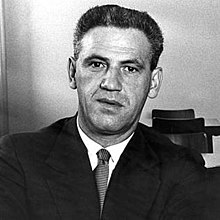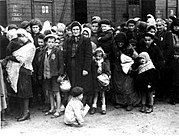"Nazis were Right-Wing Socialist Authoritarians."
Of course they weren't.
There were Left wing socialists, like the communists and the Progressives.
The Nazis, and their Polish allies who killed 3 million Jews, were as Leftist as the Bolsheviks.
A year after Lenin's death, 1924, the NYTimes published a small article about a newly established party in Germany, the National Socialist Labor Party, which "...persists in believing that Lenin and Hitler can be compared or contrasted...Dr. Goebell's....assertion that Lenin was the greatest man second only to Hitler....and that the difference between communism and the Hitler faith was very slight...." November 27, 1925.
a. "Hitler often stated that he learned much from reading Marx, and the whole of National Socialism is doctrinally based on Marxism." George Watson, Historian, Cambridge.
b. "Socialists in Germany were national socialists, communists were international socialists." Vladimir Bukovsky.
Nazi and Russian propaganda posters....except for the language, almost identical.
You didn't know that????
Nazis unlike Republicans are actually Right-Wing.
Nazis were by every classical definition were Right-Wing, they were Nationalists, Traditionalists, for Hierarchy, and for Authoritarianism.
As for Polish allies of Nazis?
Polish were the first to fight the menace of Nazi Germany, you dumb bozo.
If anything Poland was more along the lines of the first enemies of Nazi Germany.
Of course they weren't. The Nazis were socialists like the Bolsheviks and the Progressives.
You didn't know that??
The Poles worked alongside the Nazis.
“liable to blur the historical truths regarding the assistance the Germans received from the Polish population during the Holocaust.”
https://www.history.com/news/poland-holocaust-law-death-camps
I do like the pain the truth causes you.
Republicans have nothing to do with the real Right-Wing in practice.
Nazis actually do.
Nazis might be more evil than Republicans, but Nazis were also a lot more smart.
Nazis had a lot of good technology, and scientists, Republicans not so.
Nazis had actually understood that Capitalism, and Jews sell out to Liberalism, Republicans think the opposite.
Jews were worse Nazi collaborators, if anything than Poles were.
Jewish historian Emanuel Ringelblum who lived his last days in the Nazi German controlled Warsaw Ghetto, had specifically stated that Nazi collaborator Jewish Ghetto Police were more brutal Nazis, than the Polish Blue Police Nazi collaborators.
Both were ultimately bullied into their careers of being Nazi collaborators by gun point, but ultimately as usual Jews were more VILE (Nazis), than Poles were.
Ooooo.......I really put a burr under your saddle, you donkey.
Excellent.
You can always expect both the truth and the pain it brings, from this quarter.
Now.....how many Jewish men, women and children did you say the Poles killed to aid the Nazis????
What about Jewish Nazi collaborator filth?
I guess they get a free pass.
Eliezer Gruenbaum - Wikipedia
In 1942 he was arrested (as a communist, not as a Jew) and sent to
Auschwitz concentration camp.
[2][3][4]In Auschwitz, he became a
kapo, a title given to prisoners supervising
forced labor or carrying out administrative tasks.
[6][2] He survived the camp, and after the war he was accused of
collaboration with Nazi Germany, and of "mercilessly beating inmates".
[6] He was also accused of murdering "tens of thousands of Jewish prisoners".
[2] He defended himself claiming that he only accepted the position at the request of other Jews, who wanted one of their own in the position, which was otherwise often filled by anti-Semitic non-Jewish people, including German criminals.
https://www.coursehero.com/file/p3v...so-called-order-police-or-OrdnungsdienstOD-8/
the Jewish ghetto police (the so-called order police or Ordnungsdienst—OD).8Jewish officials compiled accurate and detailed list of Jews in a particular town, carefully noting such matters as their wealth, residency status, age, sex, and occupation, with changes of residency being reported monthly.9 The indictment against the ghetto police, authored by historian Isaiah Trunk, is particularly damning: The Jewish police collected cash contributions and taxes; they assisted in raiding, guarding, and escorting hungry, mentally exhausted people on their way to places of forced labor; and it was the ghetto police who Arthur Leonard, eds., Jewish Community Book: Suwalk and Vicinity(Tel Aviv: The Yair–Abraham Stern–Publishing House, 1989), 50. During the massive deportation of some 265,000 Jews from the Warsaw ghetto in the summer of 1942, “Jewish police delivered 7,000 victims for transport to Treblinka [on July 25] and from then on delivered them at a minimum daily rate of 10,000. The average Jewish policeman in the Warsaw ghetto sent two thousand Jews to their death, in order to save his own life.” See Iwo Cyprian Pogonowski, Jews in Poland: A Documentary History(New York: Hippocrene, 1993; Revised edition–1998), 115. The Jewish police, whose numbers had swollen from 1,600 in December 1941 to nearly 2,200, made itself notorious by its cooperation with the Germans in rounding up Jews. Emanuel Ringelblum wrote (in December 1942): “The Jewish police had a bad reputation even before the deportation. Unlike the Polish police, which did not take part in the abduction for the labour camps [from spring 1941], the Jewish police did engage in this dirty work. The police were also notorious for their shocking corruption and demoralization.”
Filip Müller - Wikipedia
Filip Müller
From Wikipedia, the free encyclopedia
Jump to navigationJump to search

Müller in a postwar photo
Filip Müller (3 January 1922 – 9 November 2013) was a Jewish Slovak
Holocaust survivor and
Sonderkommando at
Auschwitz, the largest Nazi German
extermination camp during
World War II, where he witnessed the deaths of tens of thousands of people.
Contents
Auschwitz[edit]

Crematorium at Auschwitz
Müller was born in
Sereď in the
Czechoslovak Republic. In April 1942, he was sent on one of the earliest
Holocaust transports to
Auschwitz IIwhere he was given prisoner number 29236. Müller was assigned to the
Sonderkommando that worked on the construction of
crematoriaand the installation of the
gas chambers.
Judenrat - Wikipedia
The
Judenräte were to serve as a means to enforce the occupation force's anti-Jewish regulations and laws in the western and central areas of Poland, and had no authority of their own. Ideally, a local
Judenrat was to include
rabbis and other influential people of their local Jewish community. Thus, enforcement of laws could be better facilitated by the German authorities by using established Jewish authority figures and personages, while undermining external influences.
Further
Judenräte were established on 18 November 1939, upon the orders of
Hans Frank, head of the
Generalgouvernment. These councils were to have 12 members for Jewish communities of 10,000 or fewer, and up to 24 members for larger Jewish communities. Jewish communities were to elect their own councils, and by the end of 1939 were to have selected an executive and assistant executive as well. Results were to be presented to the German city or county controlling officer for recognition. While theoretically democratic, in reality the councils were often determined by the occupiers. While the German occupiers only minimally involved themselves in the voting, those whom the Germans first chose often refused participation to avoid becoming exploited by the occupiers. As a rule, therefore, the traditional speaker of the community was named and elected, preserving the community continuity.
Missions and duties[edit]
The Nazis systematically sought to weaken the resistance potential and opportunities of the Jews of
Central and
Eastern Europe. The early
Judenräte were foremost to report numbers of their Jewish populations, clear residences and turn them over, present workers for forced labour, confiscate valuables, and collect tribute and turn these over. Failure to comply would incur the risk of collective punishments or other measures. Later tasks of the
Judenräte included turning over community members for deportation. Ultimately, these policies and the cooperation of Jewish authorities led to massive Jewish deaths with few German casualties because of the minimal resistance. Once under Nazi control and checked for weapons, large numbers of Jews could ultimately be easily murdered or enslaved. The sadness of the catastrophically large number of deaths because of this lack of resistance led to the saying "never again".
[5]
Through these occupation measures, and the simultaneous prevention of government services, the Jewish communities suffered serious shortages. For this reason, early
Judenräte attempted to establish replacement service institutions of their own. They tried to organize food distribution, aid stations, old age homes, orphanages and schools. At the same time, given their restricted circumstances and remaining options, they attempted to work against the occupier's forced measures and to win time. One way was to delay transfer and implementation of orders and to try playing conflicting demands of competing German interests against each other. They presented their efforts as indispensable for the Germans in managing the Jewish community, in order to improve the resources of the Jews and to move the Germans to repeal collective punishments.
This had, however, very limited positive results. The generally difficult situations presented often led to perceived unfair actions, such as personality preferences,
sycophancy, and protectionism of a few over the rest of the community. Thus, the members of the community quickly became highly critical of, or even outright opposed their
Judenrat.
Ghettos[edit]

Metal badge of a Jewish policeman in the
Czestochowa ghetto.
Judenräte were responsible for the internal administration of ghettos, standing between the Nazi occupiers and their Jewish communities. In general, the
Judenräte represented the elite from their Jewish communities. Often, a
Judenrat had a group for internal security and control, a
Jewish Ghetto Police (German: Jüdische Ghetto-Polizei or Jüdischer Ordnungsdienst). They also attempted to manage the government services normally found in a city, such as those named above. However, the Germans requiring them to deliver community members for forced labor or deportation to
concentration camps, placed them in the position of cooperating with the German occupiers. To resist such orders was to risk summary execution, or quick replacement and inclusion in the next concentration-camp shipment.
In a number of cases, such as the
Minsk ghetto and the
Łachwa ghetto,
Judenräte cooperated with the
resistance movement. In other cases,
Judenräte cooperated with the Germans.
The role of the Judenräte in the Holocaust[edit]
Hannah Arendt wrote in her 1963 book,
Eichmann in Jerusalem, that without the assistance of the
Judenräte, the registration of the Jews, their concentration in ghettos and, later, their active assistance in the Jews' deportation to extermination camps, fewer Jews would have perished because the Germans would have encountered considerable difficulties in drawing up lists of Jews. In occupied Europe, the Nazis entrusted Jewish officials with the task of making such lists of Jews along with information about the property they owned. The
Judenräte also directed the
Jewish Ghetto Police to assist the Germans in seizing Jews and loading them onto transport trains leaving for
concentration camps.
Haavara Agreement - Wikipedia
Haavara Agreement
From Wikipedia, the free encyclopedia
Jump to navigationJump to search
Part of
a series on
The Holocaust

Jews on selection ramp at Auschwitz, May 1944
Responsibility[show]
Early policies
[show]
Victims[show]
Ghettos[show]
Camps
[show]
Atrocities
[show]
Resistance[show]
Allied response
[show]
Aftermath[show]
Lists
[show]
Resources
[show]
Remembrance
[show]
The
Haavara Agreement (
Hebrew: הסכם העברה
Translit.:
heskem haavara Translated: "transfer agreement") was an agreement between
Nazi Germany and
Zionist German Jews signed on 25 August 1933. The agreement was finalized after three months of talks by the
Zionist Federation of Germany, the
Anglo-Palestine Bank (under the directive of the
Jewish Agency) and the economic authorities of Nazi Germany. It was a major factor in making possible the migration of approximately 60,000 German Jews to Palestine in 1933–1939.
[1]
The agreement enabled Jews fleeing persecution under the new Nazi regime to transfer some portion of their assets to
British Mandatory Palestine.
[2] Emigrants sold their assets in Germany to pay for essential goods (manufactured in Germany) to be shipped to
Mandatory Palestine.
[3][4]
March 1, 1942 Auschwitz Birkenau opened
Around 300 Jewish residents of Oświęcim were brought in to lay foundations. From 1940 to 1941, 17,000 Polish and Jewish residents of the western districts of Oświęcim were expelled from places adjacent to the camp







